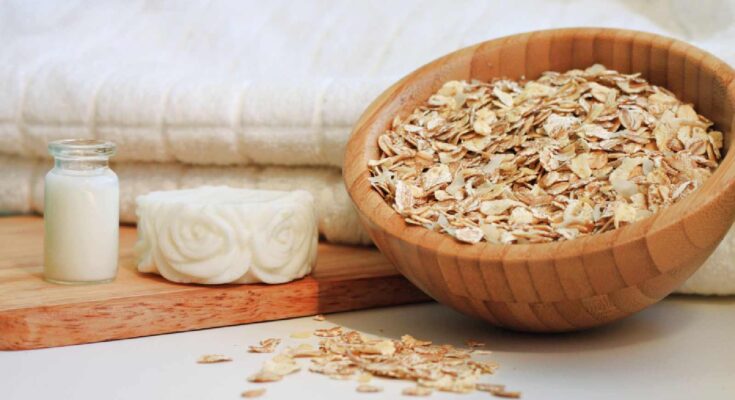My breakfast often consists of oats, which are known for offering health benefits. Turns out, oats are good for skin too. No wonder why so many skin care products have oats as a major ingredient. In fact, as per a 2022 study published in the US National Library of Medicine, colloidal oatmeal, which is finely ground oats mixed into creams and other skin care products, or bathwater, may help to soothe sunburned skin. When I ended up with skin allergy, my mom even suggested that I take an oatmeal bath. Let’s see what an expert has to say about this home remedy for skin allergy.
Oats are hailed as a healthy dietary choice, mainly due to their high fiber content, says Dr Vichitra Sharma, Consultant, Department of Dermatology, Amrita Hospital, Faridabad. It aids in promoting digestive health and potentially lowering cholesterol levels. Oats offer a source of sustained energy and contribute to a sense of satiety.

Does oatmeal improve skin?
Oatmeal can deliver numerous benefits to the skin when incorporated into skincare routines and products. These advantages predominantly stem from its inherent qualities and soothing characteristics. Here are some of the benefits of oatmeal for skin:
1. Oatmeal alleviates irritated skin
Oatmeal boasts anti-inflammatory properties, offering solace and relief to irritated or inflamed skin. It is frequently used to get rid of discomfort associated with conditions like eczema, psoriasis, sunburn and insect bites.
2. Oatmeal moisturises dry skin
Oatmeal contains beta-glucans that establish a protective barrier on the skin’s surface, effectively locking in moisture, the expert tells Heath Shots. This proves particularly advantageous for people with dry or sensitive skin, as it provides hydration and alleviates dryness and itching.
3. Oatmeal provides gentle exfoliation
Finely ground oatmeal serves as a mild exfoliant, aiding in the removal of dead skin cells and unclogging pores. This leaves the skin smoother and softer, all without causing undue irritation or damage.
4. Oatmeal balances sebum production
Oatmeal plays a role in regulating the skin’s oil production, making it suitable for those with oily or acne-prone skin. It cleanses the skin without stripping it of essential moisture, so it reduces the likelihood of excessive oiliness.
Select Topics of your interest and let us customize your feed.
5. Oatmeal diminishes redness
Oatmeal’s anti-inflammatory properties reduce redness and blotchiness in the skin. This makes it an excellent ingredient for soothing sensitive or rosacea-prone skin, says Dr Sharma.
Does oatmeal help allergic reactions?
Oatmeal can be used in diverse ways to alleviate symptoms of allergic reactions. However, people with severe allergies should consult a doctor first. Here’s how to use oatmeal for allergy:
1. Oatmeal bath
• Fill a bathtub with lukewarm water and place a muslin bag filled with finely ground colloidal oatmeal under the running water to create an oatmeal-infused bath.
• Soak in the bath for 15 to 20 minutes to soothe itching, redness and inflammation that all pop up during allergic reactions like hives or skin rashes.

2. Oatmeal paste
• Mix finely ground oatmeal with water to form a thick paste.
• Apply the paste directly to the affected skin area, and allow it to sit for 15 to 20 minutes.
• Rinse with cool water to reduce itching and inflammation.
3. Oatmeal face mask
• Combine finely ground oatmeal with yogurt, honey or aloe vera gel to create a calming face mask.
• Gently apply to facial skin, but avoid the eye area.
• Leave it on for 15 to 20 minutes before rinsing with lukewarm water to relieve facial skin affected by allergic reactions or redness.
4. Oatmeal compress
• Create a potent oatmeal infusion by steeping oatmeal in hot water and straining the liquid.
• Let it cool to room temperature and soak a clean cloth or cotton pad in the oatmeal infusion.
• Apply the soaked cloth to the affected skin area for 10 to 15 minutes to reduce itching and inflammation.
You can also go for oatmeal-based skincare products that are available in stores. While oatmeal is generally safe for most people, make sure you do not have an oatmeal allergy before using it for allergic reactions. Also, it may be best to get your skin allergy looked at by a dermatologist before using any home remedies to treat it.
Source link




